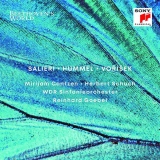 Beethoven's World (3); Antonio Salieri: La Follia di Spagna (Variationen für Orchester); Johann Nepomuk Hummel: Doppelkonzert G-Dur op. 17 für Violine, Klavier & Orchester; Jan Hugo Vorisek: Symphonie D-Dur op. 23; Mirijam Contzen, Violine, Herbert Schuch, Klavier, WDR Sinfonieorchester Köln, Reinhard Goebel; 1 CD Sony Classical 19075929602; Aufnahme 06/2019, Veröffentlichung 06/2020 (78'15) - Rezension von Remy Franck
Beethoven's World (3); Antonio Salieri: La Follia di Spagna (Variationen für Orchester); Johann Nepomuk Hummel: Doppelkonzert G-Dur op. 17 für Violine, Klavier & Orchester; Jan Hugo Vorisek: Symphonie D-Dur op. 23; Mirijam Contzen, Violine, Herbert Schuch, Klavier, WDR Sinfonieorchester Köln, Reinhard Goebel; 1 CD Sony Classical 19075929602; Aufnahme 06/2019, Veröffentlichung 06/2020 (78'15) - Rezension von Remy Franck

Reinhard Goebel und das WDR Sinfonieorchester präsentieren eine weitere CD mit Raritäten von Zeitgenossen Beethovens. Das Programm beginnt mit den 1815 komponierten Variationen über das barocke Follia-Thema von Antonio Salieri (1750-1825). Obwohl Salieri selten vom Thema abweicht, ist sein Werk eine Folge von farbenfrohen und von kompositorischen Einfällen strotzenden Orchestervariationen, in denen zahlreiche Instrumente solistisch zur Geltung kommen. Die verblüffende Vielfalt entsteht durch brillante Art und Weise, wie er verschiedene Instrumente oder Kombinationen ausnutzt, eine wirkliche Anthologie der symphonischen Möglichkeiten anzubieten. Unter Goebels inspirierter Leitung spielt das WDR Sinfonieorchester das herrliche Divertimento in Variationenform mit Elan und Vitalität.
Auf dem Album erklingt danach vom jungen Johann Nepomuk Hummel (1778-1837) das Doppelkonzert für Violine und Klavier aus dem Jahre 1804. Das Werk atmet noch ganz den Geist von Hummels Lehrer Mozart und ist in dieser Aufnahme in einer leichten und raffiniert gemachten Interpretation zu hören.
Die CD endet mit der Sinfonie in D-Dur des Böhmen Jan Vaclav Vorisek (1791-1825). Die 1823, also zwei Jahre vor dem allzu frühen Tod des Komponisten entstandene Symphonie ist noch klassisch in der Form, enthält aber bereits Merkmale der Romantik. Der erste Satz mag nicht besonders attraktiv sein, aber das schöne und bewegende Andante, das sprudelnde, federnde Scherzo und das drängende Finale stellen die Originalität des Komponisten heraus. Es gibt viele Aufnahmen von dieser Symphonie, einige haben einen ausgesprochen tschechischen Charakter, andere betonen mehr die Nähe zu Schubert. Reinhard Goebel, der ja in diesem Programm Beethoven im Blick hat, wartet mit Beethoven’schen Schwung und Dramatik auf.
Reinhard Goebel and the WDR Symphony Orchestra present another CD with rarities of Beethoven’s contemporaries
The programme begins with the Variations on the Baroque Follia Theme composed in 1815 by Antonio Salieri (1750-1825). Although Salieri rarely deviated from the theme, his work is a succession of colourful orchestral variations bursting with compositional ideas, in which numerous instruments are shown to advantage as soloists. The astonishing variety is created by the brilliant way he uses different instruments or combinations to offer a true anthology of symphonic possibilities. Under Goebel’s inspired direction, the WDR Symphony Orchestra plays the magnificent work with verve and vitality.
The album then features the young Johann Nepomuk Hummel (1778-1837) with his Double Concerto for Violin and Piano from 1804. The work still breathes the spirit of Hummel’s teacher Mozart and can be heard in this recording in a light and refined interpretation.
The CD ends with the Symphony in D major by Bohemian Jan Vaclav Vorisek (1791-1825). The symphony, written in 1823, two years before the composer’s premature death, is still classical in form, but already contains features of the Romantic period. The first movement may not be particularly attractive, but the beautiful and moving Andante, the bubbling, supple Scherzo and the urgent Finale emphasize the composer’s originality. There are many recordings of this symphony, some with a distinctly Czech character, others emphasizing more the closeness to Schubert. Reinhard Goebel, who has Beethoven in mind in this programme, comes up with Beethovenian verve and drama.
























